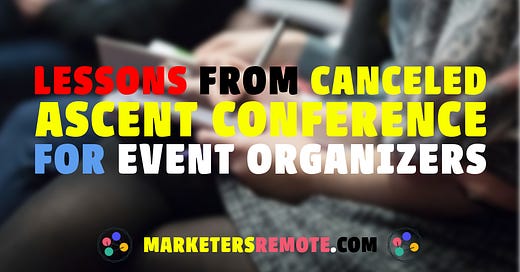Inside the Shocking Collapse of the Ascent Conference: 5 Critical Lessons for Event Organizers
Behind the Scenes of the Abrupt SF Event Cancellation
The Ascent Conference, a popular for-profit event, made headlines when it abruptly canceled its highly anticipated San Francisco conference just days before it was scheduled to take place on June 10-11, 2024.
This unexpected cancellation sheds light on the challenges faced by event organizers and the potential pitfalls that can lead to such unfortunate outcomes.
Overcoming Challenges of Running a For-Profit Conference
The Ascent Conference, like many others in the events industry, relies heavily on sponsorships and ticket sales to generate revenue and turn a profit.
However, this business model has become increasingly difficult in recent years.
Sponsors have started questioning the return on investment (ROI) and exploring alternative ways to drive demand.
Conferences like SiriusDecisions once attracted thousands of attendees, boasted impressive sponsor lineups, and offered exceptional networking opportunities.
But the landscape has changed significantly since the COVID-19 pandemic.
Today, the most prominent events are organized by industry giants like Salesforce and Qualtrics, combining user conferences with industry-focused events.
Despite the significant brand impact of these large-scale conferences, justifying their ROI through renewals and new customers has become challenging.
Even for major companies, hosting such events is now at risk of financial losses when viewed by numbers.
The Ascent Conference's Struggles and Cancellation
To attract a sizable audience and keep sponsors satisfied, the Ascent Conference resorted to giving away most tickets for free instead of charging for them.
Their New York event went relatively smoothly.
But behind the scenes, there were significant financial issues, including insufficient sponsorships and ticket sales to cover all expenses, leading to delayed payments and last-minute cuts.
For the San Francisco event, the cracks in the foundation became increasingly apparent, with recurring money issues.
Ultimately, the event was canceled, most likely due to the inability to secure enough sponsorships and ticket sales to cover the venue costs, although the exact reasons remain uncertain.
Key Lessons for Successful Event Planning and Execution
From the Ascent Conference's experience, several fundamental lessons can be learned for event organizers:
1. Prioritize Attendee and Speaker Experience
The success of an event depends on delivering exceptional content and experiences for attendees and speakers.
Providing sponsors with a highly engaged and satisfied audience will make them more likely to participate and return for future events.
As event expert Christy Lamagna puts it, "Understand the power of events and what it means to be a strategic planner. Take pride in the work you do and learn how to do it well".
2. Balance Optimism with Realistic Expectations
Optimism is key in event planning.
But it must be tempered with realistic expectations.
Events require significant upfront investments and contractual commitments, with the hope of securing sponsors and paid attendees.
If the formula is flawed, financial losses can accumulate fast.
As Benjamin Franklin famously said, "By failing to prepare, you are preparing to fail".
3. Embrace Niche and Focused Content
The more aligned the audience is with the content, the better the overall experience for everyone involved.
Having very specific and focused content can be key.
Check out my guide on marketing beyond advertising for insights on creating compelling content.
4. Consider Smaller, Intimate Events
Many industry professionals are shifting towards smaller, local events.
These often provide a more measurable return on investment.
Even organizations with significant budgets are seeing better results from smaller, more focused events.
As event planner Mary Windham shares, "Despite all my mistakes and all that life threw at me, Occasions, Inc. has developed into a highly profitable, successful business with stable staff and returning clientele".
5. Leverage Influencers for Marketing
Having influencers speak at events can provide larger marketing exposure.
It can be a cost-effective strategy for event organizers.
Explore my list of top marketing podcasts to discover potential influencers in your niche.
The Changing Landscape of For-Profit Conferences
The rise and fall of the Ascent Conference is a lesson that highlights:
the importance of prioritizing attendee experiences,
managing expectations,
focusing on niche content,
considering smaller events,
and leveraging influencers for marketing purposes.
For more insights on the marketing industry, check out our collection of epic marketing fails to learn from others' mistakes.
As the conference and event landscape continues to evolve, organizers must adapt and find innovative ways to deliver value to attendees, speakers, and sponsors alike.
Key Strategies for Success in Today's Event Market
Delivering exceptional content and experiences
Realistic financial planning and risk assessment
Embracing technology and virtual components
And That’s It
The abrupt cancellation of the Ascent Conference serves as a stark reminder of the challenges and complexities involved in event planning.
Event organizers can better navigate the evolving landscape and ensure the success of their future events as they learn from these experiences and implement the key lessons outlined above.
What strategies have you found most effective in overcoming event planning challenges? Share your thoughts in the comments below!
Looking for your next opportunity? Check out our weekly roundup of remote marketing jobs.



